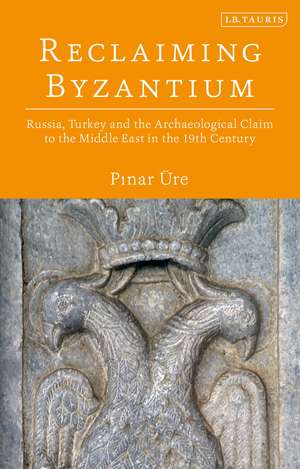Reclaiming Byzantium: Russia, Turkey and the Archaeological Claim to the Middle East in the 19th Century
Autor Pinar Üreen Limba Engleză Paperback – 25 aug 2021
| Toate formatele și edițiile | Preț | Express |
|---|---|---|
| Paperback (1) | 215.96 lei 6-8 săpt. | |
| Bloomsbury Publishing – 25 aug 2021 | 215.96 lei 6-8 săpt. | |
| Hardback (1) | 596.81 lei 6-8 săpt. | |
| Bloomsbury Publishing – 19 feb 2020 | 596.81 lei 6-8 săpt. |
Preț: 215.96 lei
Preț vechi: 274.02 lei
-21% Nou
Puncte Express: 324
Preț estimativ în valută:
41.33€ • 44.19$ • 34.46£
41.33€ • 44.19$ • 34.46£
Carte tipărită la comandă
Livrare economică 18 aprilie-02 mai
Preluare comenzi: 021 569.72.76
Specificații
ISBN-13: 9780755637232
ISBN-10: 0755637232
Pagini: 224
Dimensiuni: 138 x 216 x 15 mm
Greutate: 0.26 kg
Editura: Bloomsbury Publishing
Colecția I.B.Tauris
Locul publicării:London, United Kingdom
ISBN-10: 0755637232
Pagini: 224
Dimensiuni: 138 x 216 x 15 mm
Greutate: 0.26 kg
Editura: Bloomsbury Publishing
Colecția I.B.Tauris
Locul publicării:London, United Kingdom
Caracteristici
Traces the historical framework of Russia's involvement in the Middle East.
Notă biografică
Pinar Ure completed her PhD in 2014 under the supervision of Professor Dominic Lieven at the LSE. She received her MA from the University of Pennsylvania. She is currently Assistant Professor at Istanbul Kemerburgaz University.
Cuprins
Introduction: Regenerating Distant Past: Nationalist and Imperialist Uses of Ancient History in the 19th CenturyChapter 1: Double-Headed Eagle Over Russia: Russian Appreciation of the Byzantine Heritage1.1. Fyodor Ivanovich Uspenskii: The Making of a Russian Byzantinist1.2. The Development of Archaeology and Byzantine Studies in the Russian Empire1.3. From Russian to Ottoman Shores: The Attraction of the Black Sea as a Repository of Byzantine Monuments1.4. The Image of Byzantium in Russian Thought in the Late 19th CenturyChapter 2: Archaeology in the Ottoman Empire: Cultural Property as a Symbol of Sovereignty2.1. Byzantine Studies in the Ottoman EmpireChapter 3: At the Intersection of Science and Politics: Russian Archaeological Institute in the Ottoman Empire3.1. Russians in the Holy Land: Imperial Palestinian Orthodox Society (IPPO)3.2. The Establishment of the Russian Archaeological Institute in Constantinople (RAIK)Chapter 4: Expeditions of the Russian Archaeological Institute and Contacts with Ottoman Authorities4.1. Studies in IstanbulChapter 5: On the Eve of the Balkan Wars: Archaeology in the Midst of Political Unrest5.1. The Establishment of the Slavic Department within RAIKChapter 6: The Doom of Empires: The Fate of the Russian Archaeological Institute After 1914ConclusionSuggestions for Further ReadingBibliographyIndex
Recenzii
Reclaiming Byzantium is a compelling and sophisticated book. Pinar Üre examines how both imperial Russia and the Ottoman empire approached the archaeological past, in an age of imperial competition and nationalist mobilization. This book is a model of entangled history, examining not only the relationship between the Russian and Ottoman empires over the Byzantine and Slavic past in Ottoman territories, but equally how both states and their scholarly communities had also to confront, on the one hand, the challenge of Western empires and knowledge projects (the British and French empires and their archaeological endeavors)-but also the growing claims of nationalizing states in the Balkans: Serbia, Bulgaria, and Greece. It is a nuanced study of the relationships between power and knowledge, one conducted on several planes: inter-imperial competition; the relationship between the Russians and the Ottomans; and finally the role of emerging national states. Üre's ability to tell this story from both the Russian and the Ottoman perspective provides unexpected and important insights into how both states sought to mobilize the past for political and scholarly ends-and how both had to contend with unexpected and unwelcome challenges. This well-written, well-argued book will be of interest to scholars of both late imperial Russia and the Ottoman empire, people interested in the political roles archaeology played in the late nineteenth and early twentieth century, and anyone interested in the interplay of power and knowledge.
The book offers a thoroughly researched, well organized, and highly readable examination of imperial Russia's involvements in recovering the material culture of Byzantium during the waning years of the Ottoman Empire. Thee ideological motivations and cultural biases that influenced and guided these scientific endeavors, especially evident in the mission of the RAIC in the Balkans, are treated as matters of fact, and there is no hint of interpretation or judgment on the part of the author. Thee book exemplifies the highest quality scholarship in carrying out exactly what it sets out to do.
The book offers a thoroughly researched, well organized, and highly readable examination of imperial Russia's involvements in recovering the material culture of Byzantium during the waning years of the Ottoman Empire. Thee ideological motivations and cultural biases that influenced and guided these scientific endeavors, especially evident in the mission of the RAIC in the Balkans, are treated as matters of fact, and there is no hint of interpretation or judgment on the part of the author. Thee book exemplifies the highest quality scholarship in carrying out exactly what it sets out to do.
